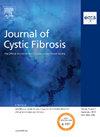Gene expression profile of intestinal organoids from people with cystic fibrosis upon exposure to elexacaftor/tezacaftor/ivacaftor
IF 5.4
2区 医学
Q1 RESPIRATORY SYSTEM
引用次数: 0
Abstract
The forskolin-induced swelling assay (FIS) in patient-derived intestinal organoids (PDIOs), used to determine in vitro responsiveness to elexacaftor/tezacaftor/ivacaftor (ETI), showed variability in swelling among PDIOs obtained from people with CF (pwCF) carrying the same F508del/F508del CFTR genotype. We aimed to characterise the effect of ETI on the transcriptional activity of PDIOs-derived cells to understand the intracellular processes triggered by ETI and the differences in treatment response. Six high- and six low-responding PDIOs to ETI, derived from F508del/F508del pwCF, were incubated with or without ETI for 2 to 6 h. Gene expression was assessed using 3′-mRNA sequencing and modelled using negative binomial models. Incubation with ETI resulted in a significant upregulation of several biological processes: mostly related to chemokines and signalling, chemotaxis, and tissue development processes. No changes were observed in abundance of the CFTR transcripts or in CFTR-related gene sets and pathways. The genes and pathways associated with ETI did not overlap with those whose expression changed with time only. PDIOs with a high FIS response did not significantly differ in any interpretable gene from the FIS-low organoids. The changes in the PDIOs gene expression upon the exposure to ETI cannot explain differences in the magnitude of PDIOs FIS-measured response to ETI. In conclusion, on incubation with ETI, genes of the CFTR-related pathways do not change their transcriptional activity; instead, overexpression was observed in genes of inflammatory-like cytokine response and receptor activation pathways.
暴露于 elexacaftor/tezacaftor/ivacaftor 后囊性纤维化患者肠道器官组织的基因表达谱。
用于确定体外对 elexacaftor/tezacaftor/ivacaftor (ETI) 反应性的患者衍生肠器官组织(PDIOs)中的福斯可林诱导肿胀试验(FIS)显示,从携带相同 F508del/F508del CFTR 基因型的 CF 患者(pwCF)中获得的 PDIOs 在肿胀方面存在差异。我们的目的是描述 ETI 对 PDIOs 派生细胞转录活性的影响,以了解 ETI 触发的细胞内过程以及治疗反应的差异。用 3'-mRNA 测序评估基因表达,并用负二项模型建模。与 ETI 一起孵育可显著上调多个生物过程:主要与趋化因子和信号传导、趋化和组织发育过程有关。在 CFTR 转录本的丰度或与 CFTR 相关的基因集和通路中未观察到任何变化。与 ETI 相关的基因和通路与仅随时间发生表达变化的基因和通路并不重叠。高 FIS 反应的 PDIO 与低 FIS 反应的有机体在任何可解释的基因上都没有显著差异。暴露于 ETI 时 PDIOs 基因表达的变化不能解释 PDIOs FIS 测定的对 ETI 反应程度的差异。总之,在与 ETI 培养时,CFTR 相关通路的基因并没有改变其转录活性;相反,在炎症类细胞因子反应和受体激活通路的基因中观察到了过表达。
本文章由计算机程序翻译,如有差异,请以英文原文为准。
求助全文
约1分钟内获得全文
求助全文
来源期刊

Journal of Cystic Fibrosis
医学-呼吸系统
CiteScore
10.10
自引率
13.50%
发文量
1361
审稿时长
50 days
期刊介绍:
The Journal of Cystic Fibrosis is the official journal of the European Cystic Fibrosis Society. The journal is devoted to promoting the research and treatment of cystic fibrosis. To this end the journal publishes original scientific articles, editorials, case reports, short communications and other information relevant to cystic fibrosis. The journal also publishes news and articles concerning the activities and policies of the ECFS as well as those of other societies related the ECFS.
 求助内容:
求助内容: 应助结果提醒方式:
应助结果提醒方式:


